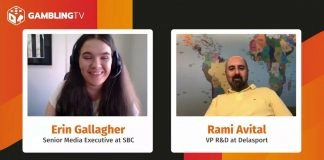No regulatory framework has ever been launched without some hurdles, and the Dutch market is no exception to this, as questions continue to linger over player protection and advertising.
Making an appearance on the latest edition of the SBC Leaders Podcast, Niels Onkenhout, CEO of Nederlandse Loterij – the Dutch state lottery – discussed opportunities and hurdles in the Netherlands online marketplace since its launch in October last year with SBC Global Relationship Director Kelly Kehn.
A key challenge with regards to safer gambling, Onkenhout stated, has been: “Making the step from saying we are protecting consumers to making sure that is really seen in everything we do and the actions we take.
“There are some companies who believe that when a problem player is someone who calls you when he or she has a problem, and even if you have a statement of purpose saying ‘we are not going to make any money off problem players’ – that is an easy way, but when you are a problem player you’re not going to call.”
This hurdle requires a ‘uniformed approach’ to what a problem player is, the CEO maintained, in order to properly address any problems. There is also a need to address older players instead of just focusing primarily on protection of young gamblers, whilst he also acknowledged that some players have multiple accounts – making deposit limits somewhat ineffective in some cases.
Blockchain technology also has potential in this case, offering the ability to link data across operators to ensure a player who has reached a deposit limit with the national lottery for example, cannot bet with any other providers.
“Those are things that I would really be proud of if I could have an impact, and I think that the industry itself should proactively make that happen as opposed to waiting until the regulator or politicians, usually not not based on facts, make decisions that are adverse,” Onkenhout continued.
The implementation of the KOA Act licensing regime on 1 October brought in a huge range of changes affecting the Dutch gambling space, not just with regards to player protection as outlined above, but also with regards to licensing.
As a result, companies active in the Netherlands before the new regulatory regime were forced by the government to cease operations in the country and reapply under the terms of the KOA Act.
“When these operators went blalck, 5% of their customers went into even worse areas, into illegal areas. The other 95% probably end up with the 10 operators who got a licence, of which the Dutch state lottery is one.”
In comparison to other operators, however, the Nederlandse Loterij has a strong home advantage, holding the status as the oldest state lottery in the world at 295 years, and having operated a sports betting division – Toto, which offered pre-match wagering – since 1955.
Onkenhout detailed that this enables the operator to be: “Very well plugged into Duch society, you understand what emotions are and how different stakeholders act and what their beliefs are and how you can anticipate.”
The Dutch state lottery, by virtue of being majority state owned he continued, also has the benefit of gaining greater understanding of goings on in the political arena. Given the current debate in the Netherlands’ House of Representatives’ on the prohibition of gambling advertising, this is an advantage many operators understandably would crave.
Observing that the Netherlands as a country is around the same size as the state of New Jersey, and with up to 20 operators expected to go live in the market, Onkenhout observed that this could cause extensive competition.
“This means a country the size of New Jersey will have 20 licensed operators offering online gambling… that is an interesting proposition, for a sizeable market, with probably good winnings for all companies,” he remarked.
“It is incredibly well built from a regulatory point of view, but with an enormous amount of rules and regulations drawn from all the experience from other countries, whether it’s the UK or Scandinavia, which is often a role model for Holland,” the CEO explained.
As such, Onkenhout maintained that although challenges remain in the Dutch market, with a strong competitive field expected as more firms enter the fray and with hurdles remaining on player protection and advertising, the country still poses a lucrative opportunity for any interested companies.




